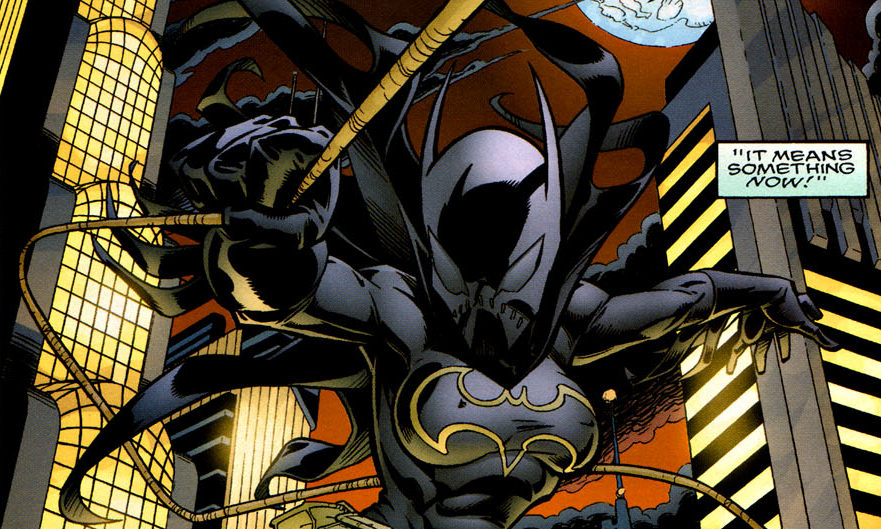Currently, Marvel X-men’s Jubilee is the unofficial face of Reappropriate. At one time, it was DC’s Cassandra Cain — a neuroatypical, mute Asian American adoptee who was the first Asian American and woman of color to take on the mantle of the Batgirl. She is also undisputedly one of the best martial artists in the DC Universe, owing to her abusive childhood when she was deprived of auditory language (or any form of social contact) and instead immersed in deadly martial arts training.
I grew up on Jubilee through her appearance in the 1990’s X-Men cartoon series. Cassandra Cain’s Batgirl occupies a different space in my fandom: her journey of self-exploration and self-agency as the newest Batgirl entered my life when I was just setting out to discover my own budding political activism. Cassandra’s efforts to reconcile her troubled past with her new life as part of the Bat-family resonated with my own exploration of political and personal identity. I love Jubilee; but, in many ways, I identify with Cassandra Cain.
Yet, the DC universe did the character of Cassandra Cain a profound disservice. Soon after she became the first Batgirl to star in her own comic book title, writers removed her disability largely because they found it difficult to write a character who couldn’t speak. That first story arc had highly problematic politics: Cassandra is mind-raped by a telepath who “fixes” her without her consent to make her more neurotypical.
Throughout the remainder of the Batgirl series, writers failed to meaningfully explore the many facets of Cassandra’s character that continue to make her unique in the comic book world: her identity as neuroatypical, as a woman of colour, and as an adoptee.
Later, Cassandra reappeared frequently as a villain for no discernible reason other than that DC writers continued to seemingly not know what to do with her. She acts erratically and is frequently revealed to be unable to escape her villainous birthright. She embodied a bunch of tired, Asian-martial-artist-slash-Dragon-Lady stereotypes. Eventually, she faded to the same place that many cool non-white superhero characters end up: as an Easter Egg background cameo in stories about white protagonists.
That mistreatment of a character whose initial concept was positively bursting with writing possibilities is a travesty.
Now, two back-to-back Cassandra Cain news give me new hope. Earlier this week, the team behind the upcoming Birds of Prey live-action film starring Margot Robbie as Harley Quinn announced that several female DC characters would be included in the film’s cast — including women of colour characters Cassandra Cain as Batgirl and Renee Montoya. I’m optimistic about this new opportunity to explore and reinterpret the Cassandra Cain character, perhaps infusing new interest in her for comic book writers. Further piquing my interest is the announcement that Cassandra will appear alongside a live-action version of Huntress. Comic fans will remember that Cassandra received the Batgirl mantle after Huntress was stripped of it by Batman. Will this interpersonal history be addressed in the Birds of Prey film? Could this be a possible source of team conflict?
Moreover, the Birds of Prey team also announced that the film would feature a Batman villain who has yet to appear on the big screen: given the power sets and backgrounds of the superheroes who have been announced, I’m speculating that the villain might be Lady Shiva. If so, could Cassandra Cain enter the storyline through her background as Shiva’s long, lost daughter?
Perhaps as early evidence that the Birds of Prey announcement regarding Cassandra Cain is due to resurgent interest in her character at DC, writer Sarah Kuhn also announced today that she will partner with DC Ink — a young-adult imprint by DC Comics — to write a graphic novel starring Cassandra Cain as Batgirl.
Y’all. I am writing a Cassandra Cain graphic novel for DC Ink, @DCComics’ YA imprint! Awesome artist TBA! This is a dream come true — I get to write my beloved Asian Batgirl! https://t.co/giNvEa8mEW pic.twitter.com/7kgtXcqyK5
— Sarah Kuhn (@sarahkuhn) July 19, 2018
Kuhn is best-known for Heroine Complex, a massively-popular young adult novel featuring a young female Asian American superhero protagonist.
I have no idea how Cassandra Cain’s character will be reinvented for these two, very different media. However, as I wrote today on Twitter, my ideal is for comic-inspired media to give us multiple flavors of a single character and to allow fans to pick and choose that which most appeals to us. I can only hope that these new opportunities to see Cassandra Cain in action will mean fresh interest in this pioneering Asian American character.
(H/T M.S.)


